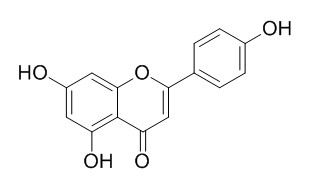Natural Products
Apigenin
| Catalog No. | CFN98843 |  |
| CAS No. | 520-36-5 | |
| Molecular Weight: | 270.2 | |
| Molecular Formula | C15H10O5 | |
| DBs | [PubChem]:274951662 [ChEMBL]:18388 [PCIDB]:3817 |
Standard InChI:
InChI=1S/C15H10O5/c16-9-3-1-8(2-4-9)13-7-12(19)15-11(18)5-10(17)6-14(15)20-13/h1-7,16-18H
Biological Activity
Apigenin, a naturally occurring plant flavone (4', 5, 7,-trihydroxyflavone) abundantly present in common fruits and vegetables including parsley, onions, oranges, tea, chamomile, wheat sprouts and some seasonings, has been shown to possess remarkable anti-inflammatory, antioxidant and anti-carcinogenic properties. [1]
Apigenin may have the potential for prevention and therapy for prostate cancer, apigenin treatment resulted in induction of apoptosis as determined by DNA fragmentation, PARP cleavage, fluorescence microscopy and flow cytometry, also resulted in down-modulation of the constitutive expression of NF-kappaB/p65.[2]
Apigenin has anti-hepatoma activity is as effective as 5-FU and its apoptotic mechanism might be mediated through the p53-dependent pathway and the induction of p21 expression.[3]
Apigenin possesses therapeutic potential against cancers, the combination of gemcitabine and apigenin enhances anti-tumor efficacy through Akt and NF-kappa B activity suppression and apoptosis induction.[4]
Product
References
[1] Patel D, Shukla S, Gupta S. Int J Oncol, 2007, 30(1):233-45.
[2] Gupta S, Afaq F, Mukhtar H. Oncogene, 2002, 21(23):3727-38.
[3] Chiang, Lien-Chai, Ng, et al. Cancer Lett, 2006, 237(2):207-14.
[4] Lee S H, Ryu J K, Lee K Y, et al. Cancer Lett, 2008, 259(1):39-49.
[5] Yang H Y, Wang X M, Gang D U, et al. Lishizhen Medicine & Materia Medica Research, 2008, 19(12):2994-5.
Product Use Citation





